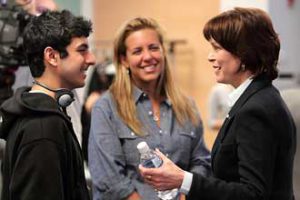
By Chris Chipello
Principal Heather Munroe-Blum fielded questions from students at the Desautels Faculty of Management on Monday, March 8. Given the setting, it wasn’t surprising that much of the dialogue focused on her thoughts about leadership and the challenges of managing a research-intensive public university.
Among her messages: in an increasingly competitive world for teaching, research and scholarship, it’s vital to have a strategic plan and to keep pushing forward. The University needs to benchmark its performance internationally to make sure it remains at the forefront in its fields of strength. “I think complacency is an enemy to quality and success.”
“I believe there’s no room for staying-the-course or for consolidation leadership,” she told the roughly 80 students, staff and faculty members assembled in Desautels’s third-floor MBA lounge. “I believe in activist leadership.”
A big part of being an effective university leader is “learning, learning, learning” and “caring passionately about your cause.”
“I learn through talking,” she said. “That can be intimidating to people, because I assert my ideas. But I’m really open to hearing other points of view, and I depend on people pushing back in expressing their views. And I would say, without exception, I’m always smarter for hearing others’ points of view — for consulting, for collaborating. I see leadership as a really distributed and broad team effort.”
And what would be her advice for students graduating this spring?
“First of all, don’t get hung up on having one job, or one thing that you think of as your definition of success going out into the work world.” When Munroe-Blum graduated with her Master of Social Work degree, she recounted, she didn’t land the job she “wanted more than anything” at a psychiatric institution. And because she didn’t get it, she wound up going to McMaster’s brand new medical center as a social worker – the start of a career path that wound in directions that couldn’t have been anticipated from the beginning. “If that was true in my generation, it is way more true today,” she said. “No matter what age you are or what degree you’re working on, you will have many more turns in the road as you go … Follow your heart, follow your interests, and be with people who respect you.”
For anyone familiar with Munroe-Blum’s poised public presence, her most surprising answer may have come when she was asked what was her biggest fear when was a 21-year-old? “Wow. Life?,” she replied after a brief pause. “I was really shy as a child, a teenager and a young adult. I mean painfully shy. I fainted when I did my first class speech when I was 11 years old. And I almost fainted when I was 13.” As a university student in a professional program centered on small-group learning in the “touchy, feely” early 1970s, she had to “share, share, share.” “I really felt very uncomfortable” so “it was just taking a deep breath each day and throwing myself into it and trying out different ways of being myself as an adult.”
On the other hand, most Baby Boomers coming of age in the 1960s and early 70s didn’t fret much about economic uncertainty or what they would do after graduation, Munroe-Blum acknowledged. “The world was about us … We didn’t worry about jobs. We had just enormous confidence in terms of the work world and what would be available to us.”
